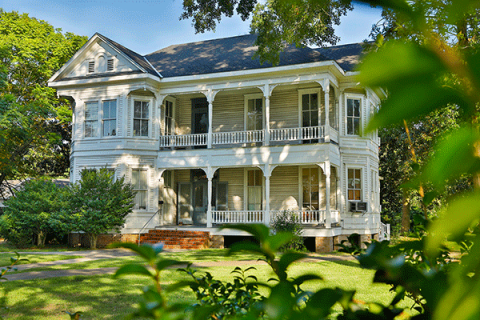It’s time to Restore the Roy.
Renovations to the J. Arthur Roy House – the oldest building on the University of Louisiana at Lafayette campus – as the new home of the Center for Louisiana Studies will begin next year. That’s because the center’s Restore the Roy initiative has reached its fundraising goal.
Dr. Joshua Caffery, the center’s director, said he’s “overwhelmed at the excitement and generosity this project has inspired.”
“Despite the turmoil of 2020, we've received an outpouring of support this year, both from people who love the Roy House and value its architectural and historical significance, as well as from people who support the mission of the Center for Louisiana Studies.”
A major gift received in November took the campaign over the finish line. Though Restore the Roy launched in 2018, fundraising for the historic structure’s restoration – and plans for its transformation into the center’s new home – began about eight years ago.
The project received a challenge grant from the National Endowment for the Humanities earlier this year. Caffery said the promise of matching funds from the federal agency “helped galvanize support and momentum that built through the spring and summer.”
The project attracted assistance from individual donors, nonprofit groups and cultural organizations, both in the region and around the state and nation. Caffery said support came from “an amazing group of philanthropic people from different walks of life who saw the possibilities of bringing this lovely building back to life as a fitting home for the study and preservation of Louisiana culture and history."
Counting all pledges and grants, the project raised about $1 million for the restoration’s initial stages. Fundraising continues to ensure the project’s completion and for future maintenance of the house and grounds, Caffery said.
Dr. Jordan Kellman is dean of the UL Lafayette’s College of Liberal Arts, which includes the Center for Louisiana Studies.
He said the fundraising initiative’s “amazing success couldn’t have happened without these generous donors, and without the vision, passion and dedication of Dr. Caffery, as well as the center’s previous director, Dr. Michael Martin, and the staff of the University’s Office of Development.”
The Roy House, situated at the corner of Johnston Street and University Avenue, was completed in 1901. It is the only University structure listed on the National Register of Historic Places.
The 120-year-old home – built by businessman J. Arthur Roy the same year Southwestern Louisiana Industrial Institute, now UL Lafayette, welcomed its first students – has never had a major renovation, Caffery noted. But that’s about to change.
The building needs new plumbing and electrical systems; central air conditioning and heat; modern insulation in the walls, ceilings and floors; and new interior and exterior paint.
Restoring the elaborate ornamental wood and tilework that adorns the home’s interior will receive special attention, Caffery said.
“The Roy House’s true treasures are its interior touches, the quality of the mantlepieces, the staircase, and the woodwork and tilework in general. At some point, that woodwork was painted over, but we'll be bringing it back to its original, natural finish.”
In addition, the grounds of the home will be relandscaped with native plants and flowers.
The Center for Louisiana Studies is UL Lafayette’s oldest research center. Established in 1973, it promotes scholarly investigation of Louisiana’s people and history.
Its research division houses the Archive of Cajun and Creole Folklore, the largest collection of audiovisual materials related to the traditional cultures of southwestern Louisiana.
The center also oversees the University of Louisiana at Lafayette Press. It is currently located on the third floor of Edith Garland Dupré Library.
Restoration plans for the Roy House include a reading and listening room where scholars and patrons can access the center’s audiovisual archives, and a bookstore where UL Press and other Louisiana-focused titles will be sold.
“I anticipate that the Roy House will become an inspiring setting for creativity and scholarship anchored in the richness and depth of regional and statewide culture,” Caffery said. “It will be a hub for our culture in the middle of the Hub City, and a fitting home for the Center for Louisiana Studies.”
Find more about the Center for Louisiana Studies, the Roy House and the Restore the Roy initiative by visiting restoretheroy.org.
Photo credit: The J. Arthur Roy House is the oldest building on UL Lafayette’s campus and the only one listed on the National Register of Historic Places. (Photo credit: Doug Dugas / University of Louisiana at Lafayette)
